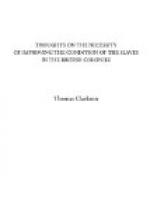Neither have the masters of slaves in our colonies any title to their slaves on account of any charters, which they may be able to produce, though their charters are the only source of their power. It is through these that they have hitherto legislated, and that they continue to legislate. Take away their charters, and they would have no right or power to legislate at all. And yet, though they have their charters, and though the slavery, which now exists, has been formed and kept together entirely by the laws, which such charters have given them the power to make, this very slavery is illegal. There is not an individual, who holds any of the slaves by a legal title: for it is expressed in all these charters, whether in those given to William Penn and others for the continent of North America, or in those given for the islands now under our consideration, that “the laws and statutes, to be made there, are not to be repugnant, but, as near as may be, agreeable, to the laws and statutes of this our kingdom of Great Britain.” But is it consistent with the laws of England, that any one man should have the power of forcing another to work for him without wages? Is it consistent with the laws of England, that any one man should have the power of flogging, beating, bruising, or wounding another at his discretion? Is it consistent with the laws of England, that a man should be judged by any but his peers? Is it consistent with the same laws, that a man should be deprived of the power of giving evidence against the man who has injured him? or that there should be a privileged class, against whom no testimony can be admitted on certain occasions, though the perpetrators of the most horrid crimes? But when we talk of consistency on this occasion, let us not forget that old law of Barbadoes, made while the charter of that island was fresh in every body’s memory, and therefore in the very teeth of the charter itself, which runs thus: “If any slave, under punishment by his master or by his order, shall suffer in life or member, no person shall be liable to any fine for the same: but if any person shall wantonly or cruelly kill his own slave, he shall pay the treasury 15 l.” And here let us remark, that, when Lord Seaforth, governor of Barbadoes, proposed, so lately as in 1802, the repeal of this bloody law, the Legislature of that island rejected the proposition with indignation. Nay, the very proposal to repeal it so stirred up at the time the bad passions of many, that several brutal murders of slaves were committed in consequence; and it was not till two or three years afterwards that the governor had influence enough to get the law repealed. Let the West Indians then talk no more of their charters; for in consequence of having legislated upon principles, which are at variance with those upon which the laws of England are founded, they have forfeited them all. The mother country has therefore a right to withdraw




